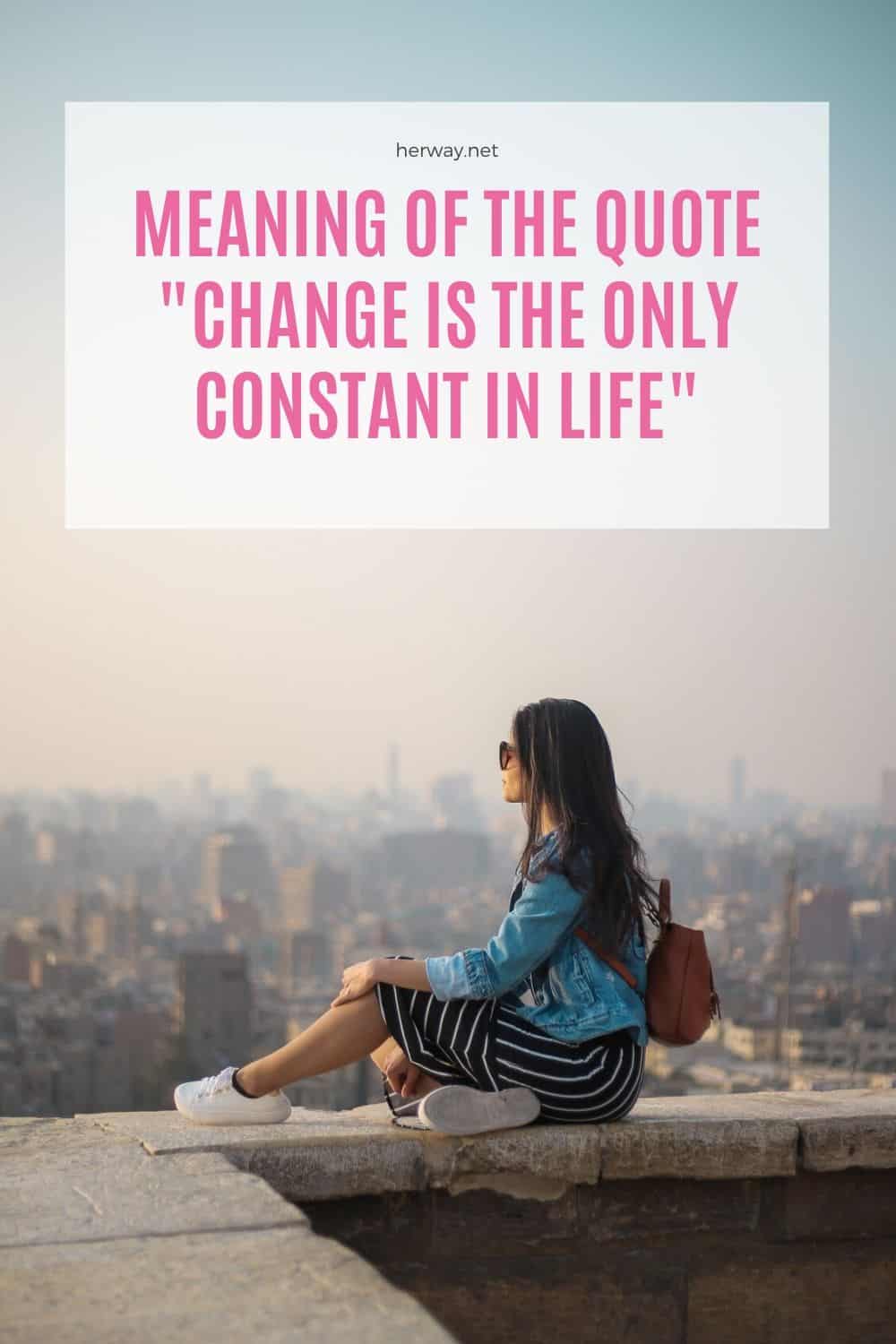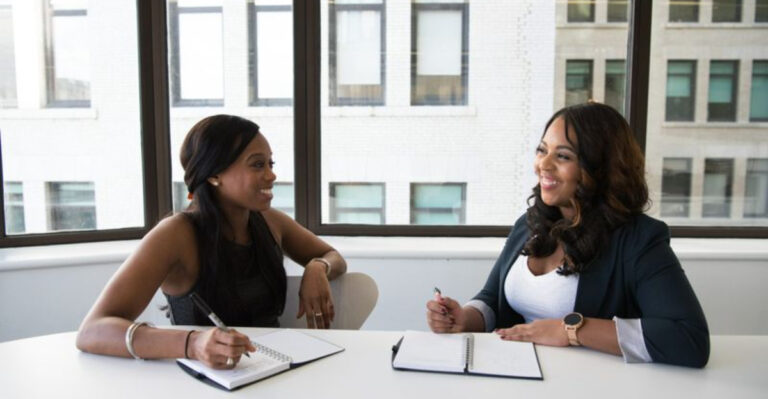Meaning Of The Quote “Change Is The Only Constant In Life”
“Change is the only constant in life” is a famous saying by the Greek philosopher Heraclitus.
The truth is that no one knows what the future holds. Every single night, we lie down to sleep, not knowing if we’re going to wake up in the morning. It’s a scary but reasonable thought.
We often take life for granted, even though we know it’s fragile. We put too much time and attention on things that don’t matter in the long run. Not only that but we actively resist change and I don’t quite understand why.
The pre-Socratic philosopher Heraclitus of Ephesus also said that life is flux. Everything changes every day.
One of his most famous assertions is: “No man ever steps in the same river twice, for it’s not the same river and he’s not the same man.”
This was to say that everything is constantly changing, even though it might look the same.
This ancient Greek philosopher believed that people’s resistance toward continual change is what makes them suffer in life.

For example, an interesting phenomenon that peaked in the last few decades (even though it’s been happening throughout history for a very long time) is people’s excessive need for comfort.
Ironically enough, an opportunity for that same comfort has come through someone’s openness to change.
Every ground-breaking scientist who made our lives more convenient was a change seeker, observer and embracer.
The problem is that we have become so obsessed with feeling comfortable that our mind becomes restless.
We buy food that someone else prepared for us. We use smartphones that think instead of us. We rely on gadgets to do our chores.
We work from home to feel more relaxed and run on a treadmill because it’s more convenient than going out and maybe, God forbid, experiencing something unexpected.

We’re allowing ourselves to be programmed by our own fear, which has resulted in heightened problems with mental issues, pandemic depression, anxiety and other things of the same nature.
In a way, we are going against our nature that requires a balance of all the things that make up the human being: body, mind and spirit. A balance is achieved by stimulating every part equally.
But why are we afraid of change so much? Why do we strongly dislike unexpected things? What unbearable feelings do they trigger in us?
One reason is that we focus on what we have to give up instead of what we can gain.
The second thing that came to my mind is a loss of control, which stems from perfectionism which originates from the fear of making mistakes.
The third thing I thought about was the discomfort of uncertainty. After all, we have a survival instinct that keeps us alert to spot potential dangers and uncertainty is what triggers it.

The final thing is a surprise. A surprise doesn’t leave enough time to get used to new ideas or to think about how to react to it.
That’s why people often choose to say no to something new, rather than yes. They don’t feel confident about accepting something they know nothing about.
However, change has an impact on all of us. No one can escape it; that’s why it’s best to just embrace it.
To embrace change means accepting life as it is. That’s the best we can do.
We don’t choose the circumstances of our life but we can choose how we react to them. Life changes often come uninvited. The only way you can be ready for them is by not being afraid and embracing them.
How to embrace changes?

“When patterns are broken, new worlds emerge.” – Tuli Kupferberg
As I mentioned previously, the key to embracing change is our own attitude toward them.
If we see everything as the end of the world, then that’s what it’s going to be for us. On the other hand, if we see it as a temporary obstacle, then that’s the only thing it is.
We can’t fully influence what’s happening around us but we can control what’s happening inside of us.
This goes for all the things that make up life; from the smallest changes like variations in the weather to big life events, no matter how happy or tragic they are.
See change as something good. Every change brings something new and new things challenge us to grow. Sometimes a change is the only hope in our life, something we long for.
If we could see past the fear, we’d realize that every change is just one step on our way up to fulfilling our full potential. It’s a tool for personal growth.

Celebrate your growth. Look back on all the things you have gone through and give yourself some credit. We’re often too hard on ourselves and forget about the things we achieved by our hard work.
The hectic environment we live in keeps us always needing more, with better and faster results for everything we do.
Learn to control your survival instinct that screams: Danger! A part of the human condition is being concerned with survival, which is a necessary trait for every living being.
However, sometimes those concerns are overexaggerated and just keep us from taking a step forward in life.
Unnecessary fears that are deep in our subconscious and our conscious mind are what keep us from getting the things we really want.
Instead of seeing everything as a potential danger, we should use the other parts of our human nature to fight those primal urges, especially since we live in a modern world where most of us don’t experience such scales of life-threatening situations.

Silence your need to always know everything. Sometimes people rely too much on reason to explain everything we experience in life.
On the other hand, one thing many people get detached from is their intuition. Intuition is not a hoax; it’s a valuable ability.
It’s important to know when to go with the flow, when to give up and when not to give in—all the things intuition can help us with.
Open up to new experiences. Why is it important to be open to new experiences? They enrich our daily life.
Exposing ourselves to new ideas and unfamiliar information keeps our interest in life and makes us more flexible and flexibility is an important factor when it comes to change.
Every time we learn something new, we’re seizing the opportunity to better our life.
Be skeptical of widely accepted things. Now, I’m not condemning using common sense, I’m only asking you to question all things in life. If something is deeply entrenched, it doesn’t mean it should be.

Ask yourself why you do the routine things you do. Psycho-emotional sturdiness is sometimes just a reflection of our lifelong habits that have been imposed on us ever since we can remember.
Not all familiar and safe things are necessarily good. Clinging to something just because we’re afraid of the effort that comes with it is an example of lazy resistance toward change and, eventually, something better.
Don’t be afraid to say goodbye to your old self. In order to accept change, we need to come to terms that we change too. Everything about human life is changeable and transient.
Our body replaces itself every seven years and our beliefs and emotions change daily.
We’re living proof that change is the only constant thing, yet we refuse to accept that part of our nature and cling to the illusion of safety.
Challenge yourself every day and see how your life changes and how inspiring that change is. Without it, you wouldn’t even know how capable you really are.

Ditch your comfort zone. Even once you reach certain goals in life, it’s important to keep pushing yourself to do more—because you can.
Objectively, you probably can do more things than your mind is telling you, if only you could gather up the courage to try them.
Such things include constant change. However, all of this can benefit both your personal and professional life.
Ditching your comfort zone is how you become more knowledgeable of yourself and that means you become more confident too.
Not only that but others will perceive you as credible and you will open new doors for yourself. That’s how you’ll learn new things that will lead you to new knowledge to implement in your life.
With new knowledge comes a greater understanding of our purpose, which then puts us at ease.
When there’s meaning behind the things we do, we’re happier and more content with our life because, as the Greek philosopher, Parmenides said: “To be and to have meaning are the same.”

Ask for help if you’re feeling lost. Change can be very stressful and influence your life greatly.
It’s not surprising when a person feels overwhelmed and somewhat lost after a big change and that’s why it’s good to talk to someone who understands you. A fresh perspective is always helpful and it can mean a lot.
By understanding all of these things, we’re simply coming to terms with the fact that change is inevitable and can be good if we want it to be.
Another thing I recommend doing is finding comfort in knowing that everything will pass. However sad it might sound at first, the underlying sense of release and letting go is what makes it comforting in the end.
Accepting a possibly difficult situation means detaching yourself from the potential pain it’s causing you. Pain, like every other emotion, is a normal thing in the life of every human.
Detaching yourself from pain doesn’t mean you should ignore it; on the contrary, you should accept it as a normal aspect of life and that’s exactly how you will overcome it much faster and more easily.

Everything you fight—persist.
Most importantly, learn to detach yourself from specific results. Almost nothing ever happens how we planned it and it still turns out well.
We can’t foresee the future and the results you get may be different from the result you expected but that doesn’t mean they will be bad.
Obsessing over specific results is what kills our spontaneity.
Trust that things will be okay. Trust that everything happens for a reason. Clinging to all patterns brings nothing but dissatisfaction and loss of meaning.
Success of any kind comes only once we embrace change. Things don’t happen by chance but by change.
Put the work in and let yourself be whatever you need to be and watch your life get better. If something happens unexpectedly, don’t panic, don’t think it’s the end of the world and don’t give up.
The power of detachment

One of the key things in embracing change is not being attached to the outcome.
Human beings are psychologically attached to many types of constructs that include hopes and ambitions, personal belief systems and ideas about the world that surrounds them, social status and achievements.
Simultaneously, we’re aware that there’s more to life than tangible things. We’re not our job, we’re not our role or the things we possess. Unfortunately, that doesn’t stop us from being too concerned with all of them.
The problem is we have built our identity and sense of self on the things we think we are, when, in reality, we’re still who we are even when those things are gone.
What’s interesting is that people often feel relief after they stop identifying themselves with one or all of these things that supposedly make up their identity.
Let things change and let yourself change. You don’t have to be the person you were before. You’re allowed to take in new discoveries and change up your life.

That doesn’t mean you’re not authentic or that you’re inconsistent. On the contrary, it means you are authentic.
Authenticity means listening to yourself and the yearnings of your soul, which includes maturing, changing and constant learning and includes the will to make progress and experience your full potential.
It means understanding that change is the only constant in life.
In the light of everything that’s been said, I’ll leave you with these inspiring words (and a call for action):
“The only way that we can live is if we grow.
The only way that we can grow is if we change.
The only way that we can change is if we learn.
The only way we can learn is if we are exposed.
And the only way that we can become exposed is if we throw ourselves out into the open.
Do it. Throw yourself.” – C. JoyBell C.








